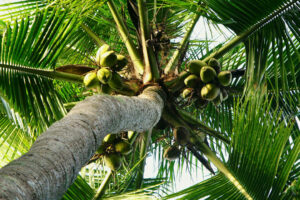
Exporters vying with biodiesel for dwindling coconut supply
By Adrian H. Halili, Reporter
THE biodiesel industry is competing for the limited supply of coconuts, crowding out exporters of products like coconut oil and coconut water, industry officials said.
“The recent increase in the country’s biodiesel requirement may possibly divert more coconuts for domestic consumption,” Romeo I. Chan, chairman and chief executive officer of Axelum Resources Corp., told BusinessWorld via e-mail.
He sees a possible erosion of volume available for export, while acknowledging “the positive benefits for the environment (from biodiesel use), better fuel efficiency and higher copra prices,” Mr. Chan said.
“We also need to caution that this may potentially erode the competitiveness of the export sector, which produces high-value coconut products and generates dollar flows for the country,” he added.
In October, the biodiesel fuel blend was raised to 3%, or B3, on order of the Department of Energy. The government plans to increase the biodiesel blend to B5 in the next three years.
“In the end, we believe this necessitates a delicate balancing act to manage its broader impacts,” Mr. Chan said.
The US Department of Agriculture has reported that El Niño could dampen coconut oil exports due to declining production.
Exports are projected to drop to 900,000 metric tons during the 2024 to 2025 market year, from 1.14 million MT the prior year.
Confederation of Coconut Farmers’ Organizations of the Philippines, Executive Director Charles R. Avila said that the increased requirement for coco-diesel may not be adequately supplied by the industry, citing limited yields due to the age of Philippine coconut trees.
“The legally expected increase in biodiesel blend is one thing. Coconut production, however, is clearly on the decline by easily 15% year on year, so it cannot be expected to meet the demand without sacrificing exports,” Mr. Avila told BusinessWorld via Viber.
Axelum’s Mr. Chan expects coconut production to be flat this year.
Coconut production hit 14.89 million metric tons (MT) in 2023, against the 14.93 million MT posted a year earlier, according to the Philippine Statistics Authority.
“There is no substitute for a serious planting or replanting program,” Mr. Avila said.
In 2023, President Ferdinand R. Marcos, Jr. ordered the Philippine Coconut Authority (PCA) to draft a plan to rehabilitate the coconut Industry, including planting 100 million coconut trees by 2028.
Under the Philippine Coconut Industry Development Plan 2024-2034, the replanting project is expected to increase coconut output by 4.7 billion nuts annually, valued at P33.1 billion, by 2034.
This year, the PCA aims to plant 15.3 million trees, followed by 25.4 million yearly between 2026 and 2028.
Mr. Avila said that coconut farmers should have a bigger role in the government’s replanting efforts.
“We can dream of greater exports and a thousand more uses of coconut products — but the evidence mounts that the only sure thing is the government denying the coconut farmers their constitutional right to participate in programs affecting their welfare and development, which, of course, is a sure formula for ultimate failure,” he added.
